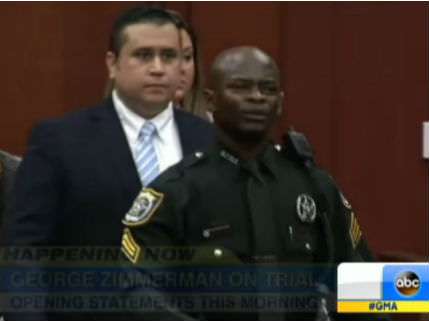Prosecutor Says George Zimmerman Shot Trayvon Martin 'Because He Wanted To'

During his opening statement in the murder trial of George Zimmerman this morning, prosecutor John Guy declared that the defendant "did not shoot Trayvon Martin because he had to." Rather, said Guy, "he shot him for the worst of all reasons—because he wanted to." If the shooting was not justified, a more likely explanation is that Zimmerman panicked in the course of a fight he was losing—that is, he feared serious injury or death, but not reasonably so, which is a requirement for self-defense under Florida law. But because Zimmerman is charged with second-degree murder, the prosecution is obliged to show, according to the standard jury instructions, that he acted "from ill will, hatred, spite, or an evil intent" and demonstrated "an indifference to human life." If Zimmerman had been charged with manslaughter, by contrast, the prosecution would have to show only that he deliberately shot Martin (which he admits) and that the shooting was not justified by self-defense. The extra burden of proving second-degree murder is leading the state to portray Zimmerman as almost cold-bloodedly executing Martin.
According to the prosecution, the person heard screaming in the background of a 911 call was Martin, who was begging for his life. Guy emphasized that the screaming stops right after the gunshot. But that is also consistent with Zimmerman's claim that he was the one screaming, because Martin was on top of him, banging his head against the pavement. On Saturday, Circuit Judge Debra Nelson ruled that the prosecution may not present testimony from expert witnesses who say the voice on the recording is Martin's. (Defense experts, not surprisingly, disputed that conclusion.) Nelson decided that the methods used by forensic voice analysts are "not reliable." But she will allow family members to testify that they recognize the voice as either Martin's or Zimmerman's.
If Zimmerman acted from "from ill will, hatred, spite, or an evil intent," as the government alleges, what exactly was the source of that motivation? Drawing from Zimmerman's call to police, Guy argued that he viewed Martin, based on his age and attire (he did not mention race, per another ruling by Nelson), as a "fucking punk" who was "real suspicious" and "up to no good." He also noted that Zimmerman, who was on edge due to a recent series of burglaries committed by young black men, at one point tells the dispatcher, "These assholes, they always get away." Gray argued that Zimmerman "profiled [Martin] as someone who was about to commit a crime in his neighborhood, and then he acted on it, and that's why we're here"—because Zimmerman was determined to "rid the neighborhood of anyone that he believed didn't belong." Maybe so, but probably not through lethal means. How do we get from the neighborhood watch organizer mistaking a teenager for a burglar to that teenager dead from a gunshot to the chest? Zimmerman's wounds after the shooting are consistent with his account of a violent struggle, although they do not show that Martin started the fight. It is even possible that Zimmerman and Martin both were acting based on a reasonable fear of serious injury or death. But assuming Zimmerman was not, manslaughter would have been a more appropriate charge for what seems like a heat-of-the-moment decision based on fear rather than hostility.
I will have a summary of the opening statement by Zimmerman's lawyer later today.


Show Comments (348)